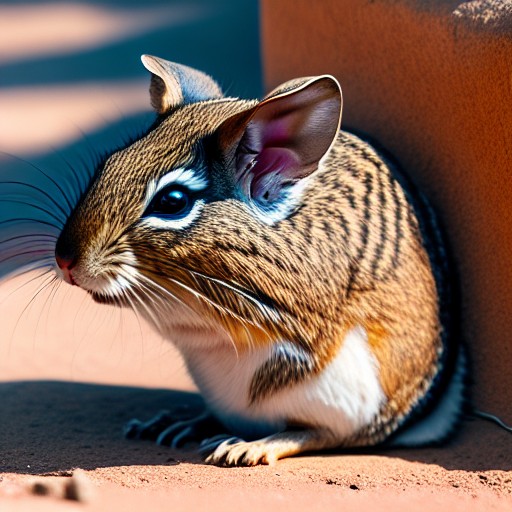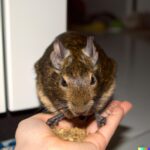If you’re considering getting a pet degu, one of the questions you might be asking yourself is whether they can live alone or if they need to be kept in pairs or groups. Degus are social animals, so it’s important to understand their behavior and social needs before bringing one home. In this article, we’ll explore whether a degu can live alone and what you need to consider before making a decision.
Degus are small, social rodents that are native to Chile. They are known for their playful personalities and their need for socialization. If you’re thinking about getting a degu as a pet, it’s important to understand their behavior and social needs. One question that often comes up is whether a degu can live alone.
Can a Degu Live Alone?
Understanding Degu Behavior
To understand whether a degu can live alone, it’s important to first understand their behavior. Degus are social animals that live in large family groups in the wild. They communicate with each other through a complex system of vocalizations, body language, and scent marking. They also groom each other, sleep together, and play together.
The Importance of Socialization for Degus
Socialization is extremely important for degus. It helps to reduce stress, prevent boredom, and promote overall health and wellbeing. Degus that are kept alone often become depressed, anxious, and lethargic. They may also develop behavioral problems such as aggression, chewing, and self-mutilation.
Can a Degu Live Alone?
While it is possible for a degu to live alone, it is not recommended. Degus are highly social animals and need the companionship of other degus to thrive. If you’re thinking about getting a degu as a pet, it’s best to get them in pairs or groups. This will provide them with the social interaction and stimulation they need to stay healthy and happy.
The Risks of Keeping a Degu Alone
Keeping a degu alone can have negative effects on their physical and emotional health. Degus that are kept alone may develop a range of health problems such as obesity, dental problems, and skin irritations. They may also become depressed and lethargic, and may exhibit destructive behaviors such as chewing on furniture and self-mutilation.
Alternatives to Keeping a Degu Alone
If you’re unable to keep more than one degu or if you’re concerned about the risks of keeping a degu alone, there are alternatives to consider. One option is to adopt a pair of degus that are already bonded. This can help to ensure that your degus have a companion and can avoid the risks associated with living alone.
Another option is to provide your degu with plenty of socialization and stimulation. This can include spending time with your degu, providing them with toys and puzzles, and creating a stimulating environment for them to explore.
Conclusion
In conclusion, degus are highly social animals that need the companionship of other degus to thrive. While it is possible for a degu to live alone, it is not recommended. Keeping a degu alone can have negative effects on their physical and emotional health, and may lead to behavioral problems. If you’re thinking about getting a degu as a pet, it’s best to get them in pairs or groups to ensure that they have the social interaction and stimulation they need to stay healthy and happy.
FAQs
- What should I do if I already have a single degu? If you already have a single degu, it’s important to consider getting them a companion as soon as possible. Introducing a new degu can be challenging, so it’s best to do so gradually and under supervision.
- Can degus live with other animals? Degus should not be housed with other animals, as they have specific social needs that may not be met by other species. They may also be at risk of injury or disease from other animals.
- What is the best way to introduce a new degu to my current degu? The best way to introduce a new degu is to do so gradually and under supervision. Start by placing the degus in separate cages next to each other so they can become familiar with each other’s scent. Then, gradually introduce them in short supervised sessions until they become comfortable with each other.
- How do I know if my degus are getting along? If your degus are getting along, they will groom each other, sleep together, and play together. They may also communicate with each other through vocalizations and body language.
- Can degus become bonded with humans? While degus are social animals that need the companionship of other degus, they can also become bonded with their human caretakers. Spending time with your degu, providing them with toys and puzzles, and creating a stimulating environment for them to explore can help to strengthen the bond between you and your degu.










